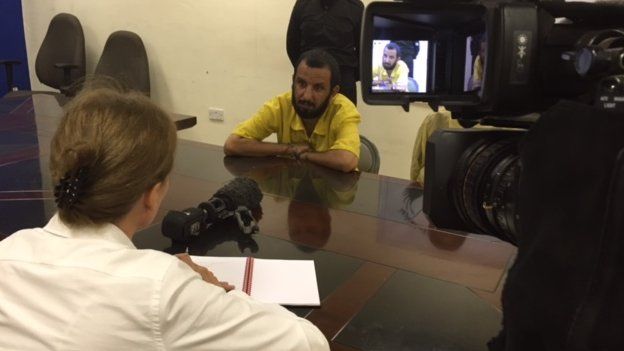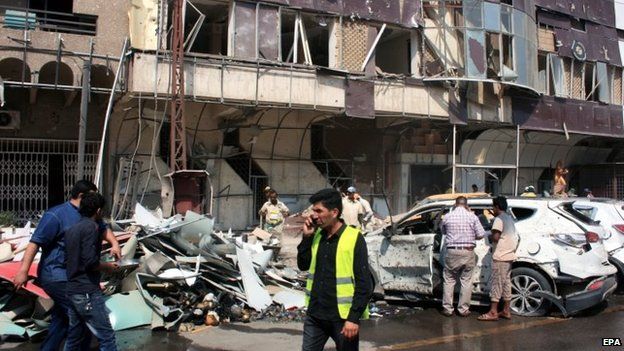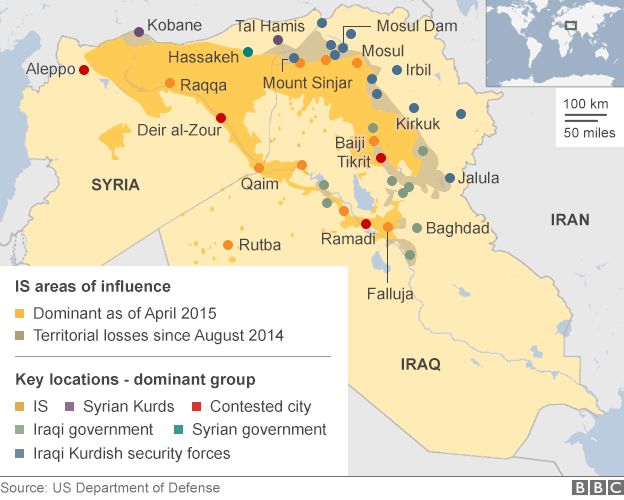Face-to-face with suspected Islamic State bombers
By Orla Guerin
For 15 days they lay in wait, monitoring their prey from a distance. The UN convoy was timed as it snaked its way through Baghdad's morning rush hour.
A lookout, posing as a taxi driver, followed behind, blending in with the traffic.When the route and routine had been mapped out by the minute, a vehicle was packed with explosives and dispatched from Ramadi about 60 miles (100km) east.
The suicide bomber spent his last night in the driver's home, before getting into position in the capital. At about 08:30 on 16 November 2014 he moved in for the kill, ramming the convoy. The only death was his own.
The bomber's steps have been retraced by Iraqi intelligence officials, who arrested the Islamic State cell behind the attack.
We were given access to the three surviving members of the cell, who admit arranging the bombing. Police claim all three are graduates of al-Qaeda. A fourth member was killed as they were detained.
Fast-tracked to Baghdad
The men were produced single file, flanked by masked police. All were handcuffed and wore yellow prison uniforms.
This was a rare opportunity to confront an IS member face-to-face about their motivations and their atrocities.
The way Haider Mansour tells it, the only thing he intended to do for IS was share his gift for reading the Koran.
He says he was busy studying accounting when the insurgents swept into Iraq's third largest city, Mosul, in June last year.
Then old friends from his prison days came calling. Mansour had formerly been an inmate in Camp Bucca, a US detention centre in southern Iraq for radical jihadists. It became an incubator for IS.
"I am in contact with so many terrorists and prisoners," he told us in a matter-of-fact tone.
"When Mosul fell a lot of people rang me. I got hundreds of calls asking me to join the organisation. When I joined I got in deep."
After less than a month of teaching at an Islamic school he was fast-tracked to the capital.
"The military commander for Baghdad pushed me to go there," he said. "He told me that the Americans killed his brother. He told me I would be hitting Americans, not Iraqis. But when I got to Baghdad I was given other orders."
'Reluctant soldier'
By his own admission he followed those orders eight times, arranging a two-month bombing spree in Baghdad late last year, which - police say - targeted civilians and the security forces. About 50 people were killed in the attacks, according to the authorities.
"I avoided following the news, apart from news of the UN attack. I felt guilty, but I had orders from the Baghdad commander."
Asked how he could attempt to justify the many atrocities of IS - beheadings, mass executions, the selling of women into sexual slavery - he didn't even try.
"This is wrong. I can't justify it. Clearly, it's wrong."
As we sat, face-to-face, I asked if he would have been prepared to behead a Western journalist like me, as other IS militants have done.
"I am not the kind of person who kills or is involved in killing," he claimed.
"Even when we deliver a car, it is the suicide bomber who blows it up, or it is detonated by remote control, with a mobile phone, from Fallujah."
Though Mansour's cell terrorised Baghdad for IS, his men claim to be victims of IS themselves.
Hussein Hamid, a gaunt 34-year old, sat alongside Mansour, insisting he was a reluctant foot soldier for the insurgents.
As he spoke a muscle flickered occasionally in his cheek. Like his boss, he's a former prisoner.
"Originally I joined them [IS]," he said. "But then I tried to get away. I always made excuses when they called. I fled from most of the operations."
I asked the married father of two daughters why he hadn't gone to the police, if he was so eager to get away.
"I would put myself and my family in danger. You can't disagree or disobey them," he said.
The third member of the cell was behind the wheel: Louay Saleh, a jobless father of four, brought cars into Baghdad for bombings.
He told us he was attracted by IS's promise of a region for Iraq's marginalised Sunnis. And then there was the money, but he said he was deceived about that.
"They said: 'You won't have to do much. We'll buy you a car and you will drive around and tell us what you see. It's a simple thing'. I was living in one room with my children. They said they would rent me a house. I needed money so I agreed."
'Easy to replace'
The men said they were speaking freely though they were in custody.
Intelligence officials say these seasoned militants specialised in sophisticated attacks, but admit IS will replace them - quickly and easily.
"In the past six months we've captured more than 40 IS cells in Baghdad," a senior commander said. "We stop them for a while but then they start over. The river won't stop flowing."


0 Comments:
Post a Comment
Subscribe to Post Comments [Atom]
<< Home